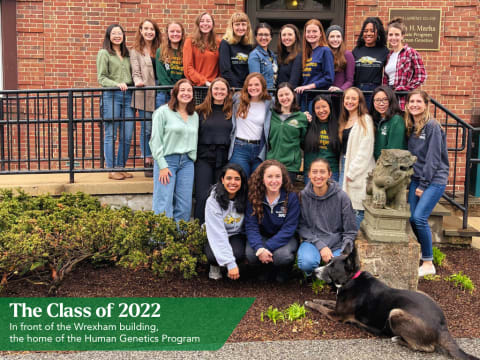The Human Genetics program believes in the positive effects of a diverse learning environment that enable students to work with people from other races, abilities, ethnicities, religions, sexual orientations, gender identities, and cultural backgrounds that could challenge the views they are accustomed to. This leads to greater awareness, understanding and acceptance of differing beliefs and customs, as well as greater communication skills, innovation of thought, and collaboration. We hold ourselves accountable to making sure that all voices are heard and sought after and endeavor to be an ally to our students and alumni and the communities they serve.
The Human Genetics Program incorporates this commitment into all aspects of the program including our hiring practices, recruitment efforts, holistic admission process, diverse scholarship opportunities, inclusive curriculum and social activities, mentorship opportunities, strong community involvement, and our wide range of student resources, universal and individualized accommodations, and mental health support.
DEIB Programs and Initiatives
Holistic Admissions
Our holistic admission process aims to see the applicant as a complete person. For this reason we are not only interested in how an applicant performs academically, instead, we are just as interested in volunteer experiences, exposure to genetic counseling, and ability to communicate your insight into the field based on these experiences.
We work to recruit and sustain a diverse admission committee and require frequent turnover of this committee to bring in new ideas and approaches. Additionally, our admission process is intentionally designed to reduce the impact of bias from any single committee member.
Diverse Curriculum
We understand that interacting with people from various backgrounds enables our students to learn to communicate more effectively and often differently than they are previously accustomed to. As communication is one of the core skills for the genetic counseling profession, we view a diverse learning setting, including a diverse student body, faculty, and curriculum, to be essential to developing this core skill. We combine independent study with collaborative work, team-based learning, and a flexible learning environment.
We regularly and intentionally engage students of all backgrounds, beliefs, and identities in complex discussions regarding power, privilege, discrimination, bias, racism, equity, and justice. This includes our Addressing Bias Curriculum where students meet monthly to examine their salient social identities and how these intersect with power and privilege.
Inclusion and Belonging
The Program works with the Office of Diversity, Equity, and Inclusion, Office of Access and Disability Services and Counseling & Psychological Services. Students have access to all services offered by these College offices. Students also have access to Student Spaces (on campus, student-run, identity spaces) and the Leadership Exploration and Discovery (LEAD) Program, a pre-orientation program for aspiring leaders, first-generation college students, and students of color.
We also initiate affinity groups (program specific, student-run identity spaces) for students in the Human Genetics Program to foster connection with other students who hold similar identities.
Other Genetic Counseling Resources
The IMPACT Program
The IMPACT program is a unique partnership between families living with Down syndrome and first year genetic counseling students at the Joan H. Marks Graduate Program in Human Genetics at Sarah Lawrence College since 2011. The program provides students with the opportunity to learn about life with Down syndrome beyond what they can learn in the classroom or clinic setting. Students can incorporate lessons learned from their IMPACT meetings into their genetic counseling practice to become advocates for the Down syndrome community and more accurately educate their future patients about life with Down syndrome.
Our Student Body
In our recent class cohorts, 55% of students self-identify as a Person of Color; 93% of students are between the ages of 22-29; and 38% of students were from countries outside of the United States, including Canada, Qatar, Namibia, The Gambia, Ghana, India, Mexico, Korea, Vietnam ,Costa Rica, Iran, Russia, Egypt, Nepal, Spain, and Ireland.
